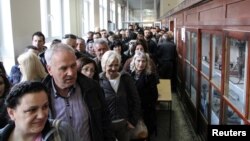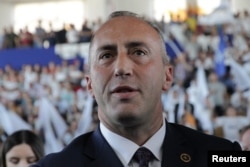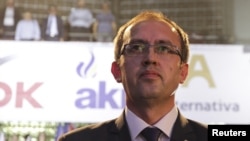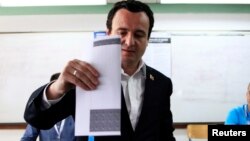Kosovars vote Sunday to choose the new 120-seat parliament that will face some seemingly intractable problems.
There is the thorny issue of the border demarcation deal with Montenegro that brought down the previous government; the continuation of fraught talks with Serbia, which denies Kosovo’s existence as a state; and potential war crimes trials of some senior political leaders.
Nineteen political parties, five coalitions and two citizens’ initiatives, all promising to break the isolation and secure growth, have nominated candidates.
Border dispute, war crimes court
Kosovo declared independence from Serbia in 2008. The new state has been recognized by 114 countries, including the United States and most of the EU members, but not by Belgrade.
Kosovo is the only western Balkan country whose citizens need visas to enter the European Union’s Schengen zone. To join, Brussels insists Kosovo must first approve the border demarcation deal.
That deal with Montenegro was signed in 2015 but opposition parties say it meant a loss of territory, over 8,000 hectares (20,000 acres), or less than 1 percent of Kosovo’s land. The former Cabinet, international experts and the country’s Western backers dispute that claim.
Another looming issue is the prospect of former ethnic Albanian senior rebel commanders facing prosecution in the newly established international war crimes court in The Hague that is expected to shortly issue indictments for crimes committed against civilians during and after the 1998-1999 war with Serbia.
Who’s who in the election
Former rebels
Three major parties run by former rebel commanders have joined forces to back Ramush Haradinaj for prime minister. Haradinaj briefly served as a prime minister in 2005 but was forced to resign after a U.N. war crimes court put him on trial for crimes allegedly committed during Kosovo’s 1998-99 war with Serbia. He was acquitted twice.
Serbia still regards Haradinaj as a war criminal. Kosovo suspended EU-sponsored talks with Serbia earlier this year after Haradinaj was arrested in France on a warrant from Serbia. A French court refused to extradite him.
Haradinaj claims his coalition is “a new beginning “ and has pledged he will persuade the EU to admit Kosovars to the visa-free regime within 90 days, and also bring fast improvements in the country’s ailing economy.
Peacenicks
The party of Prime Minister Isa Mustafa has joined forces with billionaire Behxhet Pacolli and Mimoza Kusari-Lila, a former deputy prime minister and trade minister from the Alternativa party. They have proposed the former finance minister, Avdullah Hoti, as a future prime minister.
Hoti boasts that he was successful in fighting corruption and bringing the customs and financial department in line with European standards. He earned a Ph.D. in economics at Staffordshire University in Britain and is a professor at the Pristina University.
Nationalists
The Self-Determination Movement, an aggressively disruptive force in the previous parliament, is the biggest opposition party to shun pre-election coalitions. Self-Determination Movement members and supporters released tear gas inside parliament and threw petrol bombs outside it to protest the contentious deals with Montenegro and Serbia.
The party has nominated its former leader, 42-year-old Albin Kurti, as a candidate for prime minister. Since the 2014 election, Kurti has been at the forefront of opposition forces.







